Many of us enjoy flying to new places for vacation, to visit family and friends, or to connect with work colleagues. Those flights, particularly the longer, high-altitude flights, contribute significantly to our carbon footprint. Using estimates from carbonfootprint.com, a single round-trip economy flight from SFO to Heathrow warms the atmosphere with the equivalent of 2.5 metric tons of CO2. That is the same as a year of driving an efficient car (14,000 miles at 45 mpg) or a year’s worth of household gas use (500 therms). Just two international flights can exceed a year’s worth of our transportation and home emissions. Yikes.
Will technology come to the rescue? Aircraft manufacturers are looking into electric and hydrogen-powered aircraft, but there are challenges. The relatively high weight-to-energy ratio of batteries means that battery-powered aircraft are suitable mainly for short (500-1000 mile) flights. Low density hydrogen fuel takes up significant volume, requires new infrastructure, and is subject to leaks. As an alternative, airports like SFO are looking to Sustainable Aviation Fuel, a product nearly identical to jet fuel but derived from biomass. Imagine processing food waste from our landfills into aviation fuel. Even though CO2 would still be released into the atmosphere when the fuel is burned in the jet engine, the fact that the food products absorbed CO2 from the atmosphere when they were grown means that their use reduces net emissions. Moreover, the food waste would have released some additional methane when decomposing in the landfill. That means this fuel could even be carbon negative when accounting for the avoided decomposition.
However, it is not easy to produce Sustainable Aviation Fuel and get it to the airports where it is needed at sufficient scale. We can blend it in small amounts, which will help, but it turns out we may be able to get bigger reductions with less effort by looking at contrails. The cloud-like condensation trails formed behind high-elevation flights may be the cause of most of aviation’s warming effect (though there is uncertainty around the amount), and there are several ways to reduce them.
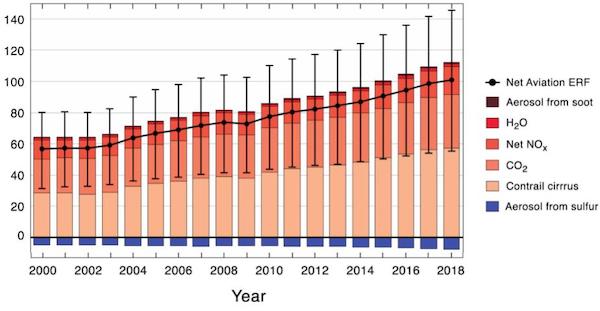
Contrail cirrus may be the cause of most aviation warming, though uncertainty about the exact amount is high. Source: The contribution of global aviation to anthropogenic climate forcing for 2000 to 2018, Lee et al, Atmospheric Environment, Volume 244 (2021)
The “contrail cirrus” shown in the graph above refers to condensation trails that last for several hours and spread out to resemble cirrus clouds. Many of these will warm the planet because they trap infrared radiation (heat) that is coming from Earth, preventing it from leaving our atmosphere. These clouds also reflect some of the incoming solar radiation, a cooling effect, but only during the day, and even that doesn’t count if other surfaces below them would have reflected that light. On average, contrail cirrus have a substantial warming effect.
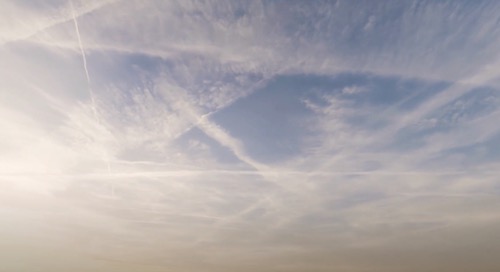
It turns out it might be easier to minimize warming contrails than to convert to a new kind of jet fuel, though ultimately we need to do both. We know that certain flight paths are more likely to form contrails than others. These tend to be at higher altitudes (e.g., 30,000 feet) in very wet and cold areas of the upper troposphere (“ice-supersaturated regions”).

The white areas represent flight regions that are very cool with high humidity, where persistent contrails are more likely to form. Source: Interactive map.contrails.org from Breakthrough Energy.
Contrails form when soot in jet exhaust attracts water vapor, cools, and forms long-lasting ice crystals. If there is some wind, the contrails will spread out into cloud-like formations, and if it stays cool, they will last many hours. These contrail clouds can cover up to 10% of the sky over the course of a year in high-air-traffic regions such as Europe and the US east coast.
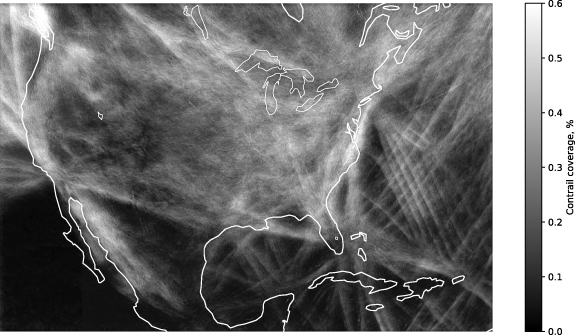
MIT scientists estimate contrail coverage over the US during 2018-2019. Source: Contrail coverage over the United States before and during the COVID-19 pandemic, Meijer et al, Environmental Research Letters, Volume 17, Number 3 (2022)
Researchers have been working to figure out which flights have the worst contrail problems and why, so they can understand how to minimize the effect. One approach would be to route planes away from these ice-supersaturated regions. An online interactive tool created by Breakthrough Energy allows you to visualize this idea by looking at routes of specific flights.
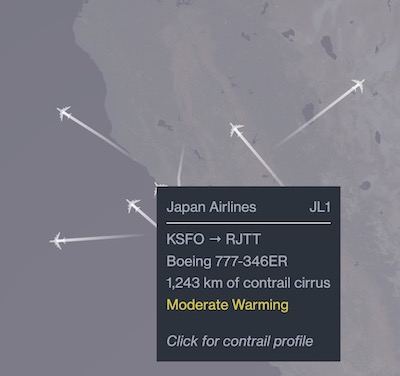
A flight leaving SFO in early August is estimated to create 1243 km of contrail cirrus. Source: Interactive map.contrails.org from Breakthrough Energy in collaboration with Imperial College of London.
Since the potential contrail regions are generally not very “thick”, flights can adjust their altitude to produce fewer long-lasting contrails.

The flight route is estimated to generate contrail cirrus as it enters ice-supersaturated regions. Source: Interactive map.contrails.org from Breakthrough Energy in collaboration with Imperial College of London.
Height is not the only factor that affects whether a contrail forms and how much it ultimately warms or cools the atmosphere. Researchers studying flights over the North Atlantic found that just 12% of flights contributed 80% of the warming. They compared the flights with the most warming contrails (in red below) with those with the most cooling contrails (in blue below). The warming contrails form most in winter (graph (a) below) and at night (graph (i)). So if we are going to reroute flights, it might make sense to focus first on winter, night-time flights. The results also show that if planes can avoid flying over low-lying clouds or other reflective surfaces (graph (j)), that can reduce the warming effect.
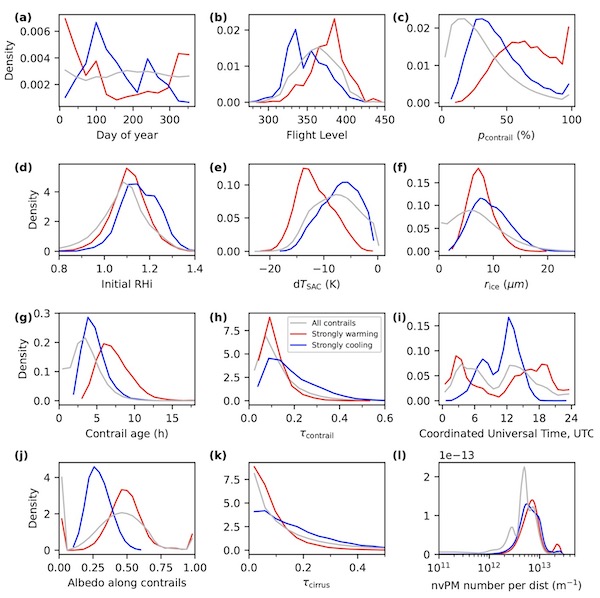
Researchers compare flights with the most warming contrails (red) with those with the most cooling contrails (blue) to understand which underlying factors may be related. The grey line shows all contrail-forming flights. Source: Aviation contrail climate effects in the North Atlantic from 2016 to 2021, Teoh et al, Atmospheric Chemistry and Physics, 22, 10919–10935 (2022).
It is also possible to reduce contrails by limiting the amount of soot produced by the engines, which would decrease the amount of seed material for the ice particles. The same study found that 43.4% of flights with strongly warming contrails are powered by one engine combustor type that produces a lot of soot. We can move away from that type of engine, and we can also clean up jet fuel by reducing the components (“aromatics”) that convert into soot. The “hydrotreatment” process that is used today to clean diesel fuel can do the job. It is an added expense, but it could be used selectively on the flights most prone to contrails. Biomass-derived jet fuel also has few of these aromatics, and could be used selectively as well. Researchers have estimated that using a cleaner fuel could reduce contrail formation by 50%, though again uncertainty is high.
One of the encouraging things about addressing global warming is that there is a good amount of low-hanging (high-flying?) fruit. Contrails are an example of that. Academics, airlines, and environmental organizations are working together to better understand the problem and possible solutions. I think we will see a lot of progress in the next five years.
Current Climate Data (June 2023)
Global impacts, US impacts, CO2 metric, Climate dashboard
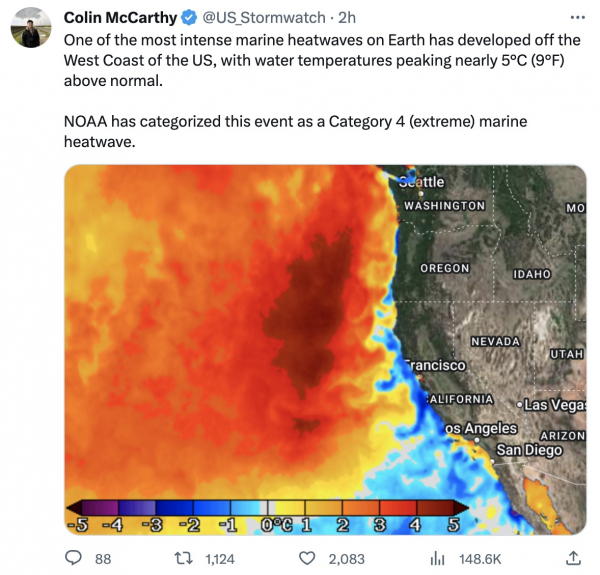
Source: Twitter/X, August 6
Comment Guidelines
I hope that your contributions will be an important part of this blog. To keep the discussion productive, please adhere to these guidelines or your comment may be edited or removed.
- Avoid disrespectful, disparaging, snide, angry, or ad hominem comments.
- Stay fact-based and refer to reputable sources.
- Stay on topic.
- In general, maintain this as a welcoming space for all readers.



